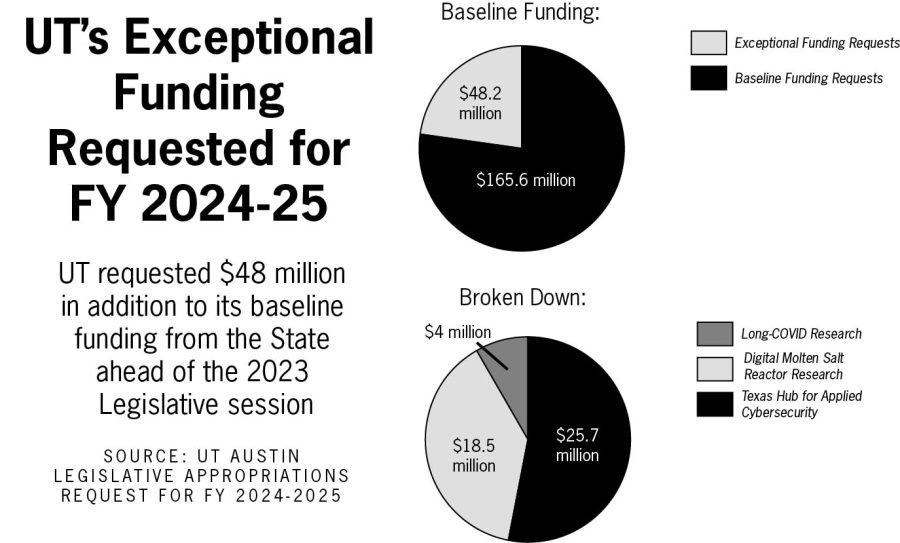UT requests $48 million in ‘exceptional items’ funding from state, including nuclear reactor research project
February 10, 2023
UT requested $48.2 million to fund several special projects in addition to its baseline funding ahead of Texas’ 88th Legislative Session, which started Jan. 10.
Each state agency, including public universities, submits a legislative appropriations request every two years, which the Legislature uses to determine a budget, according to the Senate Research Center. Universities like UT use the additional money to fund projects outside of their basic budget, coined “exceptional items.”
“These are requests that will have the greatest impact on Texas and beyond,” the University said in an emailed statement to the Texan. “This year’s requests support technology, energy and health care initiatives in the University’s 10-year strategic plan.”
According to its appropriations request, the University requested $25.3 million for a new cybersecurity hub to educate students about the field, as well as $4 million for research into long COVID-19 treatments at the Dell Medical School. A new project from the Cockrell School of Engineering could also receive an $18.5 million budget for nuclear reactor research if the legislature approves UT’s requests.
Researcher and mechanical engineering associate professor Kevin Clarno said the nuclear reactor research project would analyze operational data from molten salt nuclear reactors across the country. The team plans to use collected data to build computer models in order to predict the reactor’s future operating conditions – a “digital twin” to the physical reactor.
Engineering professor Bill Charlton, another contributor to the project, said the $18.5 million requested is the only money on the table for this project.
“It is actually quite critical that the Legislature chooses to give us this money, so we can develop that (in Texas) and then be able … to acquire funding from federal revenue,” Charlton said.
The project stemmed from a privately-funded research project involving the Georgia Institute of Technology, Abilene Christian and Texas A&M universities. Funded by Natura Resources, Clarno said this project aimed to design a molten salt research reactor for Abilene Christian University.
“There hasn’t been this field of constant innovation in the industry,” Clarno said. “One of the reasons is the regulatory environment. If someone says, ‘I want to make a change to my reactor,’ (the U.S. Nuclear Regulatory Commission) says, ‘Well, show us the data.’”
Clarno said new designs for nuclear reactors involve multi-year experiments to understand the change’s effects. Charlton said the Nuclear Regulatory Commission then conducts an independent investigation to ensure the reactor’s safety before issuing a license to build the reactor.
“It is very wise to have these digital systems where we can simulate everything,” Charlton said. “(We can) get a design that is solid so that when we submit it to the NRC, we’re not changing (it) over and over again, having to restart the process. Their regulatory process will go much faster.”
Clarno said his team hopes to continue working with their partners from the original project to develop this technology since both Abilene Christian and Texas A&M have molten salt research reactors UT could analyze to develop its digital reactor.
“We don’t want to hide in a hole and try to do it ourselves,” Clarno said. “We want to bring researchers from outside … and start working and addressing these types of problems here in Austin, where we have incredible technology to help drive and enable that.”



